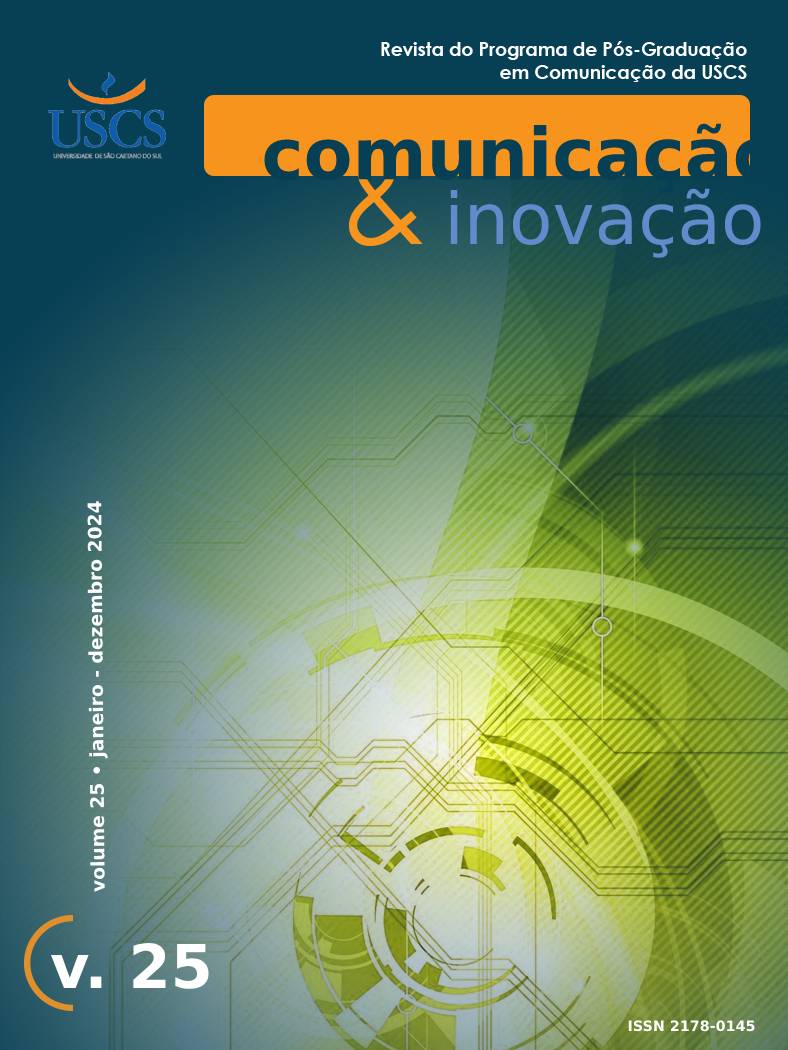Good news, bad opinions: press coverage about ChatGPT in Portugal
DOI:
https://doi.org/10.13037/ci.vol25.e20249691Keywords:
Artificial Inteligence, CHATGPT, Sentiment analysisAbstract
This paper analyzes 53 articles published in the Portuguese newspapers Público and Expresso about ChatGPT. The articles were categorized into opinion pieces and informative articles, and content analysis, sentiment analysis and a general polarity classification (positive, negative, or neutral) were applied to the texts. The results indicate a correlation between opinion pieces and feelings of anger and fear, suggesting that while news reporting views the phenomenon of generative artificial intelligence as either positive or neutral, commentators in these newspapers are hesitant towards the technology.
Downloads
References
AIAAIC - Belgian man commits suicide after bot relationship. (s.d.). Disponível em: https://www.aiaaic.org/aiaaic-repository/ai-and-algorithmic-incidents-and-controversies/belgian-man-commits-suicide-after-bot-relationship. Acesso em: 10 jan. 2024.
BOCZKOWSKI, Pablo J.; MITCHELSTEIN, Eugenia. The news gap: When the information preferences of the media and the public diverge. MIT Press, 2013. DOI: https://doi.org/10.7551/mitpress/9780262019835.001.0001
CANAVILHAS, João; ESSENFELDER, Renato. Apocalypse or redemption: how the Portuguese media cover artificial intelligence. In: Total Journalism: Models, Techniques and Challenges. Cham: Springer International Publishing, 2022. p. 255-270. DOI: https://doi.org/10.1007/978-3-030-88028-6_19
CARVALHO, Paula; SILVA, Mário J. SentiLex-PT: Principais características e potencialidades. Oslo Studies in Language, 2015, 7.1. DOI: https://doi.org/10.5617/osla.1444
CHRISTOFOLETTI, Rogério. Ética no jornalismo. Editora Contexto, 2015. DOI: https://doi.org/10.5007/1984-6924.2015v12n1p4
CRAIG, Claire. How does government listen to scientists?. Springer, 2018. DOI: https://doi.org/10.1007/978-3-319-96086-9
GILLESPIE, Tarleton; BOCZKOWSKI, Pablo J.; FOOT, Kirsten A. Media technologies: Essays on communication, materiality, and society. MIT Press, 2018.
HABERMAS, Jürgen. The theory of communicative action: Reason and the rationalization of society. Vol. 1. Beacon Press, 1984.
HAMMES, Luiz Otávio Alves; DE FREITAS, Larissa Astrogildo. Utilizando bertimbau para a classificação de emoções em português. In: Simpósio Brasileiro de Tecnologia da Informação e da Linguagem Humana (STIL). SBC, 2021. p. 56-63. DOI: https://doi.org/10.5753/stil.2021.17784
HAVENSTEIN, Heather. Spring comes to AI winter. Computer World (2005). Disponível em https://bit. ly/39uTCLN. Acesso em 24 Jul 2020
KEMPER, Jonathan. Incidents of AI misuse are rapidly increasing. THE DECODER, 5 abr. 2023. Disponível em: https://the-decoder.com/incidents-of-ai-misuse-are-rapidly-increasing/. Acesso em: 11 abr. 2023.
KOVACH, Bill; ROSENSTIEL, Tom. The elements of journalism, revised and updated 4th edition: What newspeople should know and the public should expect. Crown, 2021.
KRIPPENDORFF, Klaus. Content analysis: An introduction to its methodology. Sage publications, 2018. DOI: https://doi.org/10.4135/9781071878781
LEAL FILHO, Laurindo. A melhor TV do mundo: o modelo britânico de televisão. São Paulo: Publisher Brasil, 2006.
MASLEJ, Nestor, et al. Artificial Intelligence Index Report 2023. arXiv preprint arXiv:2310.03715, 2023.
METZ, Cade; SCHMIDT, Gregory. Elon Musk and Others Call for Pause on A.I., Citing 'Profound Risks to Society'. The New York Times, 29 mar. 2023. Disponível em: https://www.nytimes.com/2023/03/29/technology/ai-artificial-intelligence-musk-risks.html. Acesso em: 11 abr. 2024.
OPENAI. GPT-4 Technical Report (arXiv:2303.08774). arXiv, 2023. Disponível em: http://arxiv.org/abs/2303.08774. Acesso em: 11 fev. 2024.
OUYANG, Long, et al. Training language models to follow instructions with human feedback. Advances in neural information processing systems, 2022, 35: 27730-27744.
RADFORD, Alec; WU, Jeffrey; CHILD, Rewon; LUAN, David; AMODEI, Dario; SUTSKEVER, Ilya. Language Models are Unsupervised Multitask Learners, 2018.
PERRAULT, R., et al.: The AI Index 2019 Annual Report. AI Index Steering Committee, Human-Centered AI Institute, Stanford University, Stanford, 2019.
PLUTCHIK, Robert. The emotions. University Press of America, 1991.
PÚBLICO. Público foi o diário mais lido em Portugal em 2022 e cresceu 17% no digital. Público, Lisboa, 28 fev. 2023. Disponível em: https://www.publico.pt/2023/02/28/sociedade/noticia/publico-diario-lido-portugal-cresceu-17-digital-2040618. Acesso em: 1 jul. 2024.
RAMOS, Daniela Osvald. Jornalismo de qualidade: questão de democracia. MATRIZes, 2014, 8.1: 295-298.
RUSSELL, Stuart J.; NORVIG, Peter. Artificial intelligence: a modern approach. Pearson, 2016.
SIGFRIDS, Anton, et al. Human-centricity in AI governance: A systemic approach. Frontiers in artificial intelligence, 2023, 6: 976887. DOI: https://doi.org/10.3389/frai.2023.976887
SINGH, Shubham. ChatGPT Statistics for 2023 (New Data + GPT-4 Facts). Demand Sage, 18 nov. 2023. Disponível em: https://www.demandsage.com/chatgpt-statistics/. Acesso em: 1 fev. 2024.
SOUZA, Frederico Dias; FILHO, João Baptista de Oliveira e Souza. BERT for sentiment analysis: pre-trained and fine-tuned alternatives. In: International Conference on Computational Processing of the Portuguese Language. Cham: Springer International Publishing, 2022. p. 209-218. DOI: https://doi.org/10.1007/978-3-030-98305-5_20
TANDOC JR, Edson C.; LIM, Zheng Wei; LING, Richard. Defining “fake news” A typology of scholarly definitions. Digital journalism, 2018, 6.2: 137-153. DOI: https://doi.org/10.1080/21670811.2017.1360143
TRACY, Jessica L.; RANDLES, Daniel. Four models of basic emotions: A review of Ekman and Cordaro, Izard, Levenson, and Panksepp and Watt. Emotion review, 2011, 3.4: 397-405. DOI: https://doi.org/10.1177/1754073911410747
TUCHMAN, Gaye. Making News: A Study in the Construction of Reality. Free Press, 1978.
VARANASI, Lakshmi. OpenAI just announced GPT-4, an updated chatbot that can pass everything from a bar exam to AP Biology. Here’s a list of difficult exams both AI versions have passed. Business Insider. Disponível em: https://www.businessinsider.com/list-here-are-the-exams-chatgpt-has-passed-so-far-2023-1. Acesso em: 12 nov. 2023.
VASWANI, Ashish, et al. Attention is all you need. Advances in neural information processing systems, 2017, 30.
Downloads
Published
How to Cite
Issue
Section
License
Copyright (c) 2024 Renato Essenfelder

This work is licensed under a Creative Commons Attribution-NonCommercial-NoDerivatives 4.0 International License.
Conforme consta nas normas da revista, o envio de artigos e textos solicitando a apreciação com a finalidade de publicação na Comunicação & Inovação, configura a cessão de direitos autorais.
No caso de fotos e imagens, o autor deve providenciar documento que ateste a permissão em termos de direitos autorais.





